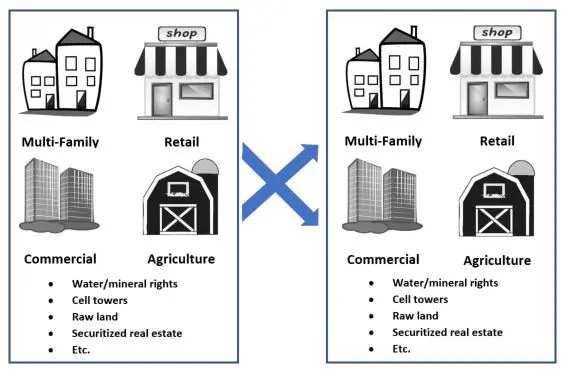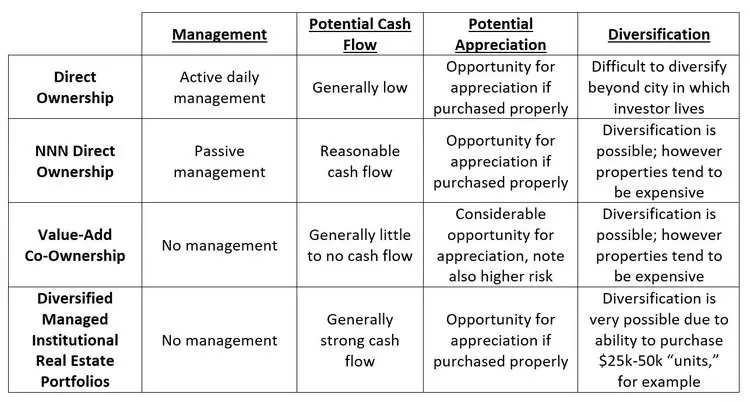What Constitutes a “Like-Kind” Exchange?
1031 Exchanges are a popular tool among real estate investors since they can be utilized in a variety of situations – all of which allow for tax deferral. Internal Revenue Code § 1031 states: “No gain or loss shall be recognized on the exchange of property held for productive use in a trade or business or for investment if such property is exchanged solely for property of like kind which is to be held either for productive use in a trade or business or for investment.”
Confusion surrounding the definition of the term “like-kind” is common. Some investors assume the criteria for establishing a like-kind exchange is both rigid and narrow, however that is not the case. Instead, the IRS focuses their definition of like-kind on the nature or character of the property, rather than its grade or quality. Simply put, real property must be exchanged for real property.
All real property held for productive use in business, trade or for investment purposes is qualified as real property for exchange purposes. It should be noted that there are a few exceptions to this rule, such as if the property is held by a real estate developer whose business is the acquisition and development of property – in this situation the real property would be classified as inventory or “stock in trade.”
As mentioned earlier, the definition of “like-kind” is indifferent to both grade or quality of the real property. This means that investment real estate of any type or class can be exchanged for one another:

The flexibility included within the IRC allows investors to pursue opportunities with their real estate exchange proceeds outside of the space in which they have previously experienced appreciation. Often, we work with investors who feel there is not sufficient opportunity in a recently owned property-type or geographic market to warrant both the market-risk and time-consuming management of their current holding. When this situation presents itself, we seek to identify the investor’s financial objectives and strategize as to how to achieve those objectives. Property-type and geographic diversification can be satisfied through identifying replacement properties that often fall within the following four categories, all of which possess unique attributes that can serve to satisfy an investor’s needs – a sampling of which are included below:

In summary, the definition of a “like-kind exchange” as established by the IRS is quite broad. When considering a tax-deferred exchange, be sure to evaluate all your options in order to find the solution that best addresses your short and long-term financial objectives.
If you have an issue or a concern relating to your investment property ownership, contact Austin Bowlin, CPA and Partner at Real Estate Transition Solutions to schedule a complimentary consultation. Austin provides exit strategy analysis, execution, income and equity replacement options for investment property owners and can be reached at 206-686-2201 or email him at aabowlin@re-transition.com.
The information herein has been prepared for educational purposes only and does not constitute an offer to purchase or sell securitized real estate investments. Such offers are only made through the sponsors Private Placement Memorandum (PPM) which is solely available to accredited investors and accredited entities. DST 1031 properties are only available to accredited investors (generally described as having a net worth of over $1 million dollars exclusive of primary residence) and accredited entities only. If you are unsure if you are an accredited investor and/or an accredited entity please verify with your CPA and Attorney. There are risks associated with investing in real estate and Delaware Statutory Trust (DST) properties including, but not limited to, loss of entire investment principal, declining market values, tenant vacancies and illiquidity. Potential cash flows/returns/appreciation are not guaranteed and could be lower than anticipated. Diversification does not guarantee profits or guarantee protection against losses. Because investors situations and objectives vary this information is not intended to indicate suitability for any particular investor. This material is not to be interpreted as tax or legal advice. Please speak with your own tax and legal advisors for advice/guidance regarding your particular situation. Securities offered through Aurora Securities, Inc. (ASI), Member: FINRA/SIPC. Advisory services offered through Secure Asset Management, LLC (SAM), a Registered Investment Advisor. ASI and SAM are affiliated companies. Real Estate Transition Solutions (RETS) is independent of ASI and SAM.

- Speak with a licensed 1031 Exchange Advisor
- Discuss your potential tax liability
- Understand benefits vs. risks
- Discuss 1031 Exchange options

